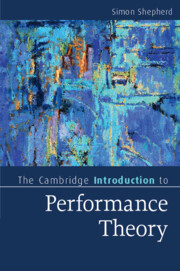Book contents
- Frontmatter
- Contents
- Preface
- Part I Definitions of performance
- Part II The emergence of performance as sensuous practice
- 6 Situationism, games and subversion
- 7 Hippies and expressive play
- 8 Performance as a new pedagogy
- 9 Architecture and the performed city
- 10 New forms of activism
- 11 Happenings and everyday performance
- 12 Body art and feminism
- 13 The arrival of Performance Art and Live Art
- 14 Dance party politics
- Part III Theorising performance
- Closing note
- References
- Index
- Cambridge Introductions to …
10 - New forms of activism
from Part II - The emergence of performance as sensuous practice
Published online by Cambridge University Press: 05 February 2016
- Frontmatter
- Contents
- Preface
- Part I Definitions of performance
- Part II The emergence of performance as sensuous practice
- 6 Situationism, games and subversion
- 7 Hippies and expressive play
- 8 Performance as a new pedagogy
- 9 Architecture and the performed city
- 10 New forms of activism
- 11 Happenings and everyday performance
- 12 Body art and feminism
- 13 The arrival of Performance Art and Live Art
- 14 Dance party politics
- Part III Theorising performance
- Closing note
- References
- Index
- Cambridge Introductions to …
Summary
There was yet another person observing the events in Paris in May 1968. In his own commentary on them Jean-Jacques Lebel used an interesting word: ‘The first stage of an uprising (the barricades, the mass demonstrations, the street fighting between the government forces and the radicals, as well as such events as the burning down of the Stock Exchange, which occurred on May 24th), the first stage of any revolution, is always theatrical’ (1969: 112).
He was not alone in his sense that political action was ‘theatrical’. Famously one of the founders of the Youth International Party, the Yippies, Jerry Rubin, talked about ‘revolution as theatre’ and the Bolivian revolutionary Che Guevara spoke, in a self-consciously ‘lyrical’ fashion, of how he learnt to see revolutionary situations in terms of ‘protagonists in the drama’ (in Baxandall 1969). Now it is clear that, across history, revolutions, uprisings and even limited protest actions have used apparently dramatic or theatrical devices and actions. Nottingham radicals in 1802 marched through the city with a figure of the Goddess of Reason; Westminster radicals in 1809 disrupted theatre performances by shaking rattles, holding placards and dancing jigs; members of the National Unemployed Workers Movement brought central London traffic to a standstill in 1939 by staging a mock funeral procession of coffins for the unemployed. These sorts of political demonstrations have been subject to much academic analysis, often in the context of research on new social movements, with the cumulative work of Charles Tilly establishing a framework for discussing political demonstrations as performances, with their own systems of reference and language (see Tilly 2008). For our purposes here, however, the interest is in the moment at which a concept and language of performance need to come into being in response to, and as shaped by, those demonstrations.
In the sixties and seventies there seemed to be a lot more of them. Not just the wave of student actions across the west but industrial disputes, strikes and demonstrations, civil rights and anti-war protests filled the cities and the news. Quite apart from quantity, however, what appears different in this period is the discourse about the events, the interest in describing not just what they do but how they function.
- Type
- Chapter
- Information
- The Cambridge Introduction to Performance Theory , pp. 94 - 101Publisher: Cambridge University PressPrint publication year: 2016



